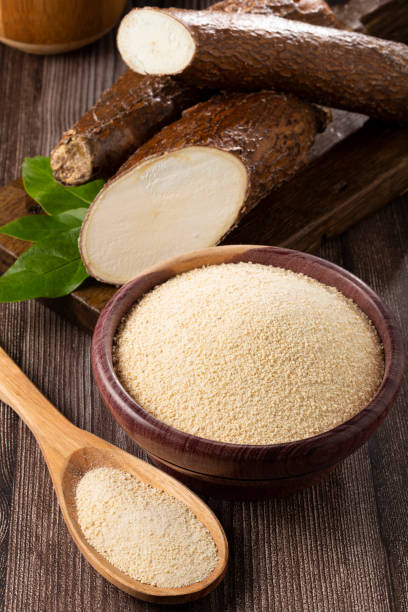Cassava tuber, a staple food for millions in Africa, is no longer just a familiar dish. It is transforming into a global business player, driven by a soaring demand for gluten-free alternatives and the ingenuity of entrepreneurs like you. If you’re looking to tap into this exciting market, Nigeria, the world’s leading cassava producer, rich with fertile fields and boundless potential. But navigating the journey from raw tuber to international export requires a roadmap.
Imagine the satisfaction of transforming readily available cassava into a product sought after across continents. Picture the pride of seeing your “Made in Nigeria” flour gracing shelves in distant supermarkets. Embrace the opportunity to empower local farmers, create jobs, and contribute to a thriving agricultural sector. This guide is your key to unlocking that potential, turning your entrepreneurial spirit into a flourishing cassava flour business.
Market Research and Viability Assessment
Before diving headfirst into cassava flour processing, a thorough market analysis and viability assessment is crucial. This lays the foundation for your business and guides your decisions across the board. Here’s how to tackle this vital step:
Understanding the Demand:
- Domestic Market:
- Research Nigeria’s cassava flour consumption trends: growth projections, preferred flour types, key consumer segments.
- Analyze the use of cassava flour in baking, confectionery, and other industries.
- Identify regions with high demand due to geographical constraints on wheat access.
- Export Potential:
- Explore international markets for cassava flour: focus on countries with high cassava consumption, wheat import dependencies, and growing gluten-free and organic food trends.
- Analyze specific demand requirements, such as flour particle size, certifications needed, and preferred packaging styles.
- Research any existing trade agreements or preferential tariffs that could benefit your exports.
Sizing Up the Competition:
- Identify existing cassava flour producers in Nigeria: their market share, strengths, and weaknesses.
- Analyze their product offerings, pricing strategies, and distribution channels.
- Use this information to identify potential niches or differentiate your product based on quality, unique blends, or sustainable practices.
Assessing Financial Feasibility:
- Estimate the startup costs: land acquisition, equipment purchase, processing facility setup, licensing fees, initial marketing expenses.
- Calculate operational expenses: raw material costs, labor costs, utilities, transportation, packaging, and ongoing quality control measures.
- Project potential revenue based on estimated production capacity, selling price, and target market demand.
- Conduct a break-even analysis to determine how much flour you need to sell to cover your costs and turn a profit.
Securing Funding:
Explore available funding options for your business: government grants, agricultural development loans, private investors, crowdfunding platforms.
Develop a strong financial pitch highlighting your business plan, market research, and projected profitability to attract investors.
By diligently evaluating the market, analyzing the competition, and crafting a realistic financial plan, you’ll lay the groundwork for a sustainable and successful cassava flour processing business.
Business Planning and Registration
Launching your cassava flour processing business requires meticulous planning and official recognition. This section will guide you through the crucial steps of crafting a strong business plan and securing the necessary licenses and permits.
Developing a Robust Business Plan:
- Vision and Mission: Define your long-term goals and core values to guide your business decisions.
- Market Analysis: Conduct a detailed analysis of the cassava flour market, including competitor analysis, target market identification, and pricing strategies.
- Production Plan: Outline your cassava sourcing methods, processing capacity, and quality control procedures.
- Marketing and Sales Strategy: Develop a plan to reach your target customers, highlighting your unique selling proposition and branding strategy.
- Financial Projections: Create realistic financial forecasts, including startup costs, operating expenses, projected revenue, and profitability timelines.
- Management Team: Introduce your team members and their expertise to demonstrate capability and instill confidence.
Registering Your Business:
- Company Registration: Register your business with the Corporate Affairs Commission (CAC) to obtain a Certificate of Incorporation and officially operate as a legal entity.
- NAFDAC and HACCP Certification: Register with the National Agency for Food and Drug Administration and Control (NAFDAC) to comply with food safety regulations and obtain mandatory certifications like HACCP (Hazard Analysis and Critical Control Points).
- Export Licenses: Apply for relevant export licenses from the Nigeria Customs Service (NCS), specifying the types and quantities of cassava flour you intend to export.
Securing Additional Permits and Licenses:
- Environmental Impact Assessment (EIA): Depending on your production scale and location, you may need to obtain an EIA from the Department of Environment.
- Waste Management Permit: Secure a permit from the relevant environmental authority to manage waste generated during the processing operations.
- Fire Safety Certificate: Ensure your facility meets fire safety standards and obtain a certificate from the Federal Fire Service.
Cassava Sourcing and Processing: From Farm to Flour

Sourcing the Golden Root:
Direct Purchase: Build relationships with local farmers or farmer cooperatives to ensure consistent supply and quality. Negotiate fair prices and establish payment terms.
Partnership Approach: Collaborate with agricultural communities or processing groups to share expertise, resources, and risks. Explore joint processing ventures or contract farming arrangements.
Market Access: Utilize online platforms or agribusiness hubs to connect with cassava suppliers across different regions. Stay informed about local market trends and price fluctuations.
Selecting the Right Variety:
High-starch content: Choose cassava varieties like cassava fufu or cassava gari, known for their high starch yield and suitability for flour production.
Disease resistance: Opt for varieties resistant to common cassava diseases to minimize losses and ensure consistent supply.
Adaptability to environment: Consider local climate and soil conditions when choosing varieties to optimize cassava growth and yield.
The Flour Journey:
Peeling and Washing: Remove peels and impurities efficiently using manual or mechanized methods like peeling machines or hydrocyclones. Ensure proper hygiene to prevent contamination.
Grating and Mashing: Break down the cassava into fine particles using manual graters, hammer mills, or raspers. Consistency affects drying and flour quality, so optimize settings for desired outcome.
Drying and Dehydration: Thorough drying is crucial for preventing spoilage and extending shelf life. Utilize solar dryers, mechanical dryers, or a combination of methods depending on scale and budget.
Milling and Sifting: Grind the dried cassava into fine flour using hammer mills or disc mills. Sieving further refines the texture and removes coarse particles for consistent quality.
Gear Up for Success:
Invest in the Right Equipment: Choose durable and efficient processing machinery based on your production capacity and budget. Consider factors like energy efficiency, maintenance requirements, and scalability.
Hygiene is Key: Implement strict hygiene protocols throughout the process, from sourcing to packaging. Regularly clean and sanitize equipment and workspaces to prevent contamination.
Quality Control Every Step: Conduct quality checks at each stage: cassava quality upon arrival, moisture content after drying, and flour particle size after milling. Ensure consistency and compliance with export standards.
Packaging with Purpose:
Durable and Secure: Choose packaging materials that protect the flour from moisture, pests, and damage during transportation. Consider vacuum sealing for extended shelf life.
Informative and Attractive: Create visually appealing packaging with clear labeling including product information, brand identity, nutritional facts, and export markings.
Exporting Cassava Flour: Navigating the Global Market
Taking your cassava flour beyond Nigerian borders and into the international arena opens exciting possibilities for growth and increased profitability. However, exporting involves additional steps and considerations beyond domestic business:
Target Market Research:
- Research potential export markets beyond neighboring countries. Analyze each market’s cassava flour demand, existing suppliers, price range, and consumer preferences.
- Identify specific niche markets within your chosen countries where your unique brand or specialty product might excel.
- Analyze trade agreements between Nigeria and your target markets, seeking opportunities for reduced tariffs or preferential treatment.
Building Connections and Partnerships:
- Seek out established distributors and importers in your chosen markets with experience handling food products.
- Attend international trade shows and conferences to network with potential buyers and learn about market trends.
- Leverage online platforms and marketplaces dedicated to agricultural products to connect with global buyers.
Meeting International Food Safety Standards:
- Ensuring your cassava flour meets rigorous international food safety standards is crucial for successful export.
- Familiarize yourself with relevant global standards like Codex Alimentarius and understand specific requirements for cassava flour.
- Implement stringent quality control measures throughout your production process and obtain necessary certifications from NAFDAC.
Export Documentation and Logistics:
- Partner with a customs broker experienced in handling food product exports to navigate complex documentation requirements.
- Obtain an export license from the Nigeria Customs Service for each international shipment.
- Prepare essential documents like phytosanitary certificates, certificates of origin, bills of lading, and commercial invoices.
- Research and choose efficient shipping methods based on the volume and destination of your export. Consider options like sea freight, air freight, or a combination of both.
Addressing Financial Considerations:
- Factor in additional costs associated with export, including packaging, customs fees, freight charges, and insurance.
- Research export financing options to secure working capital or manage cash flow during initial export endeavors.
- Understand currency exchange rates and fluctuations, considering options like forward contracts or hedging to mitigate risks.
Post-Shipment Follow-up and Market Adaptation:
- Maintain proactive communication with your chosen distributors and monitor customer feedback in your target markets.
- Stay up-to-date on changing regulations, evolving consumer preferences, and potential new opportunities in your export markets.
- Be prepared to adapt your packaging, branding, or product characteristics to better suit regional demands if necessary.
Conclusion
Reaching the finish line on your cassava flour export journey requires both ambition and resilience. While challenges like volatile currency markets and intricate logistics may arise, the rewards of tapping into this lucrative global market are substantial.
The future of Nigeria’s cassava flour industry shines bright. By harnessing this guide’s insights and leveraging your resourcefulness, you can contribute to its exponential growth. So, take the first step, embrace the entrepreneurial spirit, and cultivate your very own story of cassava flour export success.
The journey to becoming a global cassava flour exporter starts today. Take a deep breath, embrace the opportunities, and watch your vision blossom into a thriving, internationally recognized brand. The world awaits your high-quality Nigerian cassava flour – make it your mission to deliver!












